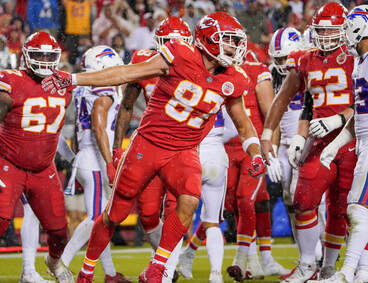|
By: Sam Kersh If your favorite NFL team has made the playoffs, then you know how it goes: feelings of excitement, nervousness, and heartbreak prevail. However, as regulation comes to a close, these emotions are even more noticeable. With both teams’ seasons on the line, the clock slowly winds down to zero - but the score remains tied. Overtime.  Travis Kelce celebrates after catching a touchdown pass during the Chiefs’ matchup against the Bills. Travis Kelce celebrates after catching a touchdown pass during the Chiefs’ matchup against the Bills. After an 18-week regular season, everything comes down to this. Fortunately, the two teams, who are even after four competitive quarters, will have an even playing field entering the overtime period. But is it really all that even? On Sunday, January 23, the Buffalo Bills traveled to Arrowhead Stadium in Kansas City for a divisional round matchup with the Chiefs, but the results sparked controversy. The game was dominated by both teams' offenses. Combined, quarterbacks Josh Allen and Patrick Mahomes threw for an incredible 700 yards and 7 touchdowns, with multiple lead changes in the fourth quarter. Nonetheless, the game kept getting crazier. With 13 seconds left and trailing by three, the Chiefs stunningly marched down the field into field goal range, and kicker Harrison Butker sent the game into overtime. Throughout regulation, both teams’ defenses were atrocious; therefore, the overtime period was doomed to end quickly. Ultimately, Josh Allen and the Bills offense did not get a chance to drive down the field, as the Chiefs emerged victorious, 42-36. Was the overtime period over before it even began? Yes, and the reason is simple: the coin toss. At first read, that claim may seem peculiar. I once thought the same. But when I further evaluated what occured at Arrowhead Stadium on Sunday night, I quickly realized the NFL overtime rules need to be discussed. Based on the current rules, a touchdown on the first overtime drive ends the game. This is why the rules are so flawed: both teams need to get the football. “Unfortunately, the coin toss went the way that it did . . . The rules are what they are, and I can't complain about that 'cause if it was the other way around, we'd be celebrating too,” said quarterback Josh Allen while addressing the media. A common opposing viewpoint is that “football is both a game of offense and defense,” and that if a team can not make a stop on defense, they don’t deserve the ball on offense. However, there is a blatant flaw in this argument - if football is about offense and defense, how come the team that wins the coin toss can emerge victorious without their defense even stepping on the field? “I’m a [Baltimore] Ravens fan, so my perspective on the situation is pretty unbiased,” said sophomore Michael Nagle. “The rules just don’t make sense to me. Both teams should have to play offense and both teams should have to play defense, simple.” The team that loses the coin toss has to first make a stop, and then drive down the field to at least field goal range in order to win the game. This is a fact. On the contrary, the team on the winning side of the coin toss needs just one solid offensive drive to win the game. This is also a fact. Therefore, saying “football is both a game of offense and defense” is extremely hypocritical. Yes, defense is equally as important as offense, which is why both teams should have to play both sides of the ball, regardless of the coin toss results. So, until the rules are readdressed, heartbreaking overtime losses are here to stay. Get comfortable…
1 Comment
Zorais
3/21/2022 10:38:14 am
I like how this article talks about a huge issue with football, I feel like people who complain about the coin toss are dismissed as sore losers but it can make overtime a lot less fun for all fans
Reply
Leave a Reply. |
Archives
May 2024
|